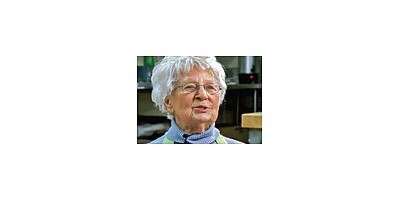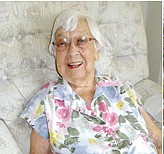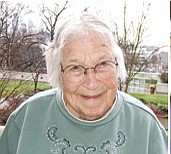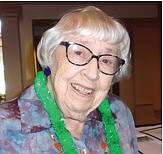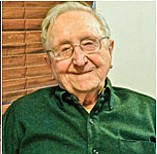Superagers – Living Well to 100 and Beyond
February 1, 2014 at 10:07 a.m.
Did you catch the recent coverage about the 100-year-old teacher? Agnes Zhelesnik was recently featured on several news outlets including CBS’s Sunday Morning program.
Believed to be the oldest living teacher in America, Agnes Zhelesnik turned 100 last month. She teaches home economics at the Sundance Grade School in North Plainfield, New Jersey.
The kids call her Granny.
According to the report on Sunday Morning, Agnes puts in a full day of teaching five days a week.
Agnes was a homemaker for most of her life (her husband didn’t approve of her working, she said), but after watching the children, then the grandchildren, and then playing a lot of bridge, she said that got old and she still felt young. So she started working at age 81, reports CBS. She’s so devoted to her job that she has not called in sick since age 98.
“All the children love her,” said one of her students.
“The children make my day,” Agnes told Peggy McGlone in an interview for The Star-Ledger. “It’s a great life watching them grow up.”
In the same article, Agnes, who credits her good health to eating well and getting sleep, said she hopes to keep working for years to come. “As long as I feel well enough I will be here. The children would miss me…”
Superagers like Agnes—seniors able to maintain a healthy and active lifestyle to age 100 and beyond—are becoming a very well-studied group and their numbers are growing. Based on census data, approximately 60,000 people in the U.S. are over the age of 100. Centenarians are the fastest growing segment of our population and the numbers will quadruple in the next 40 years!
Surprisingly, Google, the Internet search giant, is getting into the longevity business. On September 18, 2013, Google’s co-founder, Larry Page, wrote “I’m excited to announce Calico, a new company that will focus on health and well-being, in particular the challenge of aging and associated diseases.
“Illness and aging affect all our families. With some longer term, moonshot thinking around healthcare and biotechnology, I believe we can improve millions of lives.”
And it seems that each month we hear another tantalizing new study promising the fountain of youth. National Geographic’s May 2013 cover shows an adorable tyke with a headline that boldly states, This Baby Will Live to be 120. The article discusses longevity studies based on genetic technologies, molecular research, and data on long-lived populations around the world. One interesting fact from the article: the genetic component of longevity seems stronger in men and yet more women are likely to live to 100. The conclusion is that women take better advantage of external factors such as diet, medical care, and other lifestyle choices than do most men.
Dr. Nir Barzilai, director of the Institute for Aging Research at Albert Einstein College of Medicine, is quoted in the article. He is optimistic about new understandings of human aging. Many researchers are now searching for genes that protect against diseases associated with aging rather than searching for the genes that cause the diseases. This new approach is the key, says Dr. Barzilai.
Despite all the focus on the genetics of longevity, in the end, the article concludes, genes only account for about 25 percent of whether a person will live past 100 or not.
Research studies and high-tech solutions looking for the answers to a long life will likely continue to tantalize us; but most experts agree that achieving longevity comes from a complex mix of genes as well as lifestyle choices such as eating well, staying mentally and physically active, and maintaining connections with friends and family. With, perhaps, a little luck thrown in for good measure.
Northwest Prime Time is proud to feature a handful of the many centenarians, or “superagers” living in the Northwest. We asked them each four questions:
Please share your secrets to a long and healthy life; What is your best advice to younger people about how to live a happy, fulfilling life;
What is one surprising or interesting change in the world that occurred during your long life – something that stands out above others;
And finally, if you had to choose only one, what change in the world makes life better than it was “in the old days.”
We hope you enjoy getting to know a little bit about this remarkable group.
Rev. Marion Kline
Rev. Marion Kline will turn 103 on April 22.
Marion has led quite the unique life. In 1956, when the Methodist Board voted to admit women as pastors, she was among the first group of 27 women nationwide to be accepted. She graduated from the UW in 1933, has a Master’s degree, and received a Master’s of Divinity while pastoring.
Marion first served a church in Wisconsin and then, at age 50, moved to the Philippines where she served as a missionary for 15 years. At 65, after moving to Olympia to help her brother, she ended up working for another ten years. She eventually retired at 75 and in 1988 moved to Wesley Homes in Des Moines where she continues to be active.
“It never occurred to me that I would live so long,” Marion said. “I simply never thought about it. I was too busy. I enjoyed life, and my 90s were very good to me.”
Marion, who never married, maintains a strong connection with others at Wesley Homes, her family, and colleagues connected with the Methodist ministry. To keep up on events, Marion reads and participates in discussion groups.
Marion’s secret to a long life: “Enjoy and try new things. I learned to play bells when I was 90. And don’t admit that you’re too old to do things. When I was 90, I went to Vancouver, BC to see five plays in a week. I published my autobiography when I was in my 90s. I didn’t discover I was old until I was 99!”
Her best advice for a happy life? “Have friends and travel with them. You have to enjoy other people. I went on 19 trips with Faith Callahan, who lived to 106.” Marion has a collection of 165 dolls from her worldwide travels.
Marion feels the most impactful change in the world during her lifetime was World War II, which changed so many people’s lives. She was separated from her boyfriend, a conscientious objector, during the war.
What change in the world stands out to Marion as making the world a better place? “Advancements in healthcare like the flu vaccine.”
Betty Negro
102-year-old Betty Negro was born on September 14, 1911 in Preston, Washington. She grew up in Preston but left at age 18 when she moved to Seattle and got a job in a bakery. She later worked for 28 years in a necktie factory. Betty married in 1937 in Camas, Washington. The couple had no children.
Betty enjoys cards, board games “and stuff like that.” Her most inspiring moment was when she joined the Catholic Church in 1956 and received her first communion. Betty still attends St. Anne’s on Queen Anne Hill.
Betty says her secret to a long and healthy life is “walking and water. I always walked a lot with my husband, taking a daily five mile loop through Lincoln Park. And I’ve always drank lots of water.”
Betty’s best advice to younger people: “Stay around old people so the old people can stay young!”
To Betty, the most surprising or interesting change in the world was when electricity came to town. “I remember when we used to use candles.” She said electricity came to Preston for the first time when she was nine years old and she still remembers when they put in the wires.
For Betty, a change that makes life better now than in “the old days” is transportation. She remembers the first family car. “Dad drove us to Issaquah and we all got store-bought shoes.” It was the first time they didn’t have to rely on the Sears catalog.
Betty moved into Bayview Retirement Community (located in Seattle’s Queen Anne neighborhood) in August, 2007.
Rose Sanders
Rose Sanders turns 101 on March 14. She was born in Genesee, Idaho.
Rose graduated from the of Idaho in 1937, where there was one girl for every six boys. She had no trouble getting dates!
She met her husband Everett at her first teaching job, where he was principal at her school. They married in 1941, had three sons and a daughter. She also has three grandsons and a granddaughter.
Rose stays active at her retirement community (Madison House). She enjoys going out to eat with her family. She loves music, and also reads and watches TV.
Throughout her long lifetime Rose enjoyed taking care of the garden and was very involved in her church. She also liked to travel, especially to the beach. Her favorite beach is Seaside, Oregon and on her 90th birthday her family took her to nearby Cannon Beach.
Her secret to a long and healthy life? “Exercise is important.” Rose walks after every meal. She grew up on a farm and still loves being outdoors.
Rose’s best advice about living a happy life? “Be active, both physically and mentally. Being happy is a choice,” says Rose. She used to play the piano and also believes that music is an important part of life.
She thinks the way technology has grown is the most surprising change in the world over the course of her long life. “I’m still amazed that my grandchildren take pictures from their cell phones!”
If she had to choose only one change in the world that made life better than it was “in the old days,” it would be when her family got their first freezer. She still remembers when the butcher shop got its first freezer and customers were able to use it.
Rose moved into Kirkland’s Madison House retirement community in August of 2013.
George Dondero
George Dondero was born on October 13, 1913 in San Francisco.
He and his wife Betty raised their son and daughter in Marin County. George is proud grandfather of five and has many great grandchildren including a three-month-old baby boy.
George was in natural materials and manufacturing. After retirement he and Betty moved to Sun Valley to ski and be close to family. That’s when George’s new work began. He and his son developed life-saving ski and motorcycle safety innovations. George also created rock climbing equipment, another sport he enjoyed.
George has always stayed physically and intellectually active. At age 100 he paints watercolors and is the current Bocce Ball champion at Aljoya Mercer Island retirement community, where he’s lived for five years.
George’s secret to a long life is, “Do not be patient. You must make things happen for yourself by taking an active interest in subjects that interest you.” Throughout his life, George skied, hiked, played tennis (“a wonderful game that challenges the body and mind at the same time), and even took up ice dancing! “And I love to sail,” he adds. “Being on a boat is amazing fun and you can do it with people of all ages—the learning never stops.”
His best advice for a happy life? “Fall in love with fun! Make people laugh. Help others. Always take an interest in new things…live it up!”
An avid photographer, he took a photo of a friend’s daughter—that young lady became the actress Janet Leigh, her first break helped in part because of his photo. For George, one of the best changes in the world is the advancement of electronics in photography. “Color film was once very expensive. I would wait hours just to get the perfect shot and then hope it would turn out. Now, you take 20 pictures to get one perfect one. I think it’s just amazing.”
